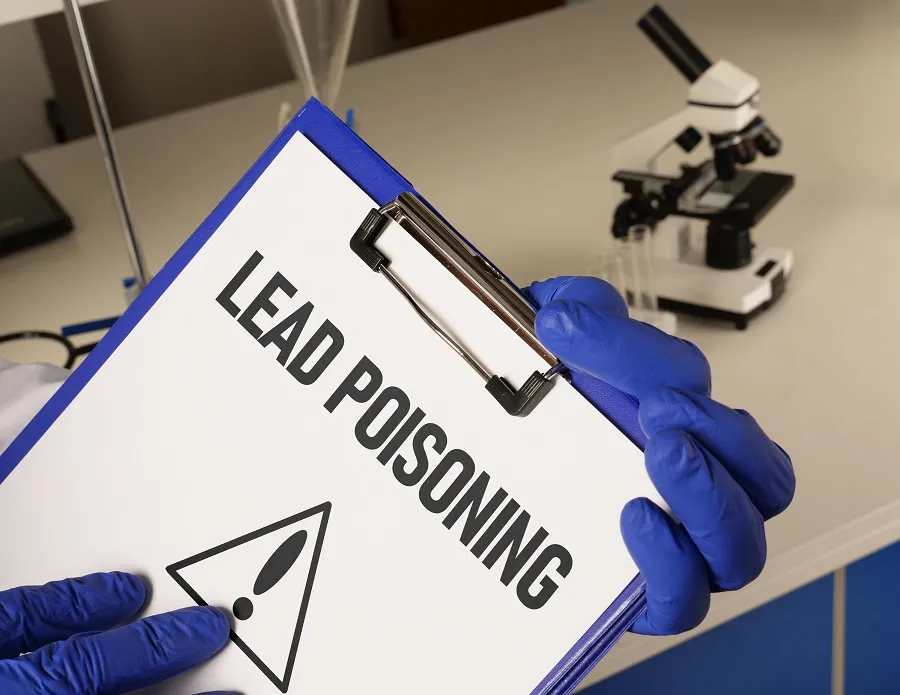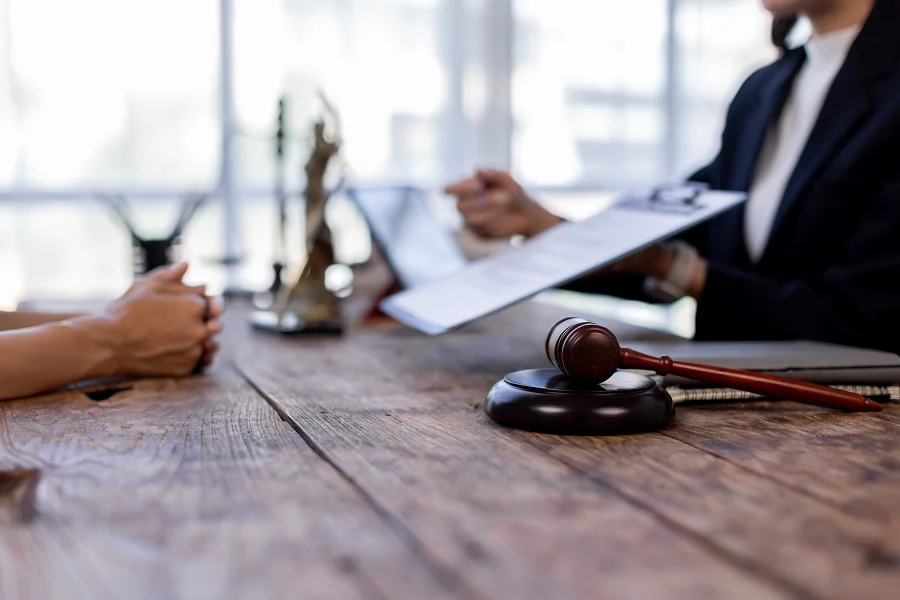Discovering that your loved ones have suffered from lead paint poisoning can leave you wondering about your legal options and rights. The shock of learning about toxic lead exposure in your home often raises immediate questions about holding negligent landlords accountable.
As experienced lead paint poisoning attorneys, we know how stressful it can be when you discover toxic lead exposure in your rental property. Finding out that your family has been exposed to lead hazards can be overwhelming, especially when children are involved. This guide will provide clear, actionable steps for New York residents facing lead poisoning claims against negligent landlords.
Can You Sue for Lead Exposure and Poisoning in NY?

Yes, you can sue for lead paint poisoning in New York under specific circumstances. Success in these cases depends on proving negligence, violation of local laws, and documented harm from lead exposure.
New York's Local Law 1 requires landlords to conduct annual inspections in buildings constructed before 1960 where children under the age of 6 reside. Title X is a federal law requiring landlords to disclose known lead-based paint hazards to tenants before they sign leases.
What Qualifies as Lead Poisoning Under NY Law
New York law recognizes lead poisoning at lower blood levels than federal standards, providing stronger protection for residents.
Blood lead level thresholds:
- Children: 5 micrograms per deciliter (μg/dL) or higher.
- Pregnant women: Any detectable level requiring medical attention.
- Adults: 10 μg/dL or higher for workplace exposure.
Symptoms that support claims:
- Developmental delays in children
- Concentration problems and learning difficulties
- Joint pain and muscle weakness
- Abdominal pain and unexplained weight loss
- Mood disorders and behavioral changes
While evidence is crucial for lead poisoning lawsuits, experienced attorneys know how to gather and present the necessary documentation to build compelling cases. Medical records and environmental testing provide the foundation for successful personal injury claims.
When You Have the Right to Sue for Lead Poisoning
Success depends on proving negligence, violation of local laws, and documented harm from lead exposure. The following situations create strong legal grounds for pursuing compensation through personal injury claims.
Landlord Failed to Disclose Lead Hazards
You never received proper disclosure about lead-based paint before signing your lease agreement. Federal and state laws require landlords to inform tenants about known lead paint hazards before the tenant moves into the property.
Important note: Even if your landlord claims they "didn't know" about lead paint, ignorance isn't a defense when disclosure laws require investigation.
You Have Medical Evidence of Lead Exposure
Blood tests or medical records show elevated lead levels in you or your family members. Medical documentation linking health problems to lead exposure significantly strengthens your legal claim.
Documented Health Problems from Lead Exposure
Your family experienced developmental delays, learning disabilities, or other health issues connected to lead poisoning. These symptoms, especially in children, provide crucial evidence for personal injury claims.

Landlord Knew About Lead Hazards but Ignored Them
You have written complaints, emails, or other evidence showing that your landlord was aware of peeling paint or lead hazards but failed to remediate them. This knowledge creates heightened liability for continued exposure.
Immediate Steps to Take If You Suspect Lead Poisoning
Time is critical when dealing with suspected lead exposure, and taking immediate action protects both your health and your legal rights. These steps create the foundation for any future legal action against negligent landlords.
1. Get Medical Testing Immediately
Seek medical testing for all family members, especially children and pregnant women, who face the greatest risk from lead exposure. Don't attempt DIY lead removal, as this can create more dangerous lead dust and lead particles. Keep all medical records and bills as they become crucial evidence for your personal injury lawsuit.
2. Document Everything Thoroughly
Take photos of peeling paint, paint chips, and any visible lead hazards throughout your rental property. Preserve paint chips or dust samples safely in sealed containers for professional testing. Document all conversations, emails, and written communications with your landlord about the lead paint exposure.
3. Contact NYC 311 to File a Complaint
Call 311 to report lead paint hazards in your rental property. This creates an official record of the dangerous conditions and triggers city inspection processes.
4. Request Lead Inspection Through HPD
Contact the Housing Preservation and Development (HPD) to request a formal lead inspection. HPD inspections provide official documentation of lead hazards that strengthens your legal claim.
5. Consider Temporary Relocation
If lead exposure is severe, especially with young children or pregnant women in the home, consider temporary relocation to prevent further toxic lead exposure. Document all relocation costs as they may be recoverable in your personal injury claims.
6. Notify Your Landlord in Writing
Send a written notice to your landlord about suspected lead paint hazards and health concerns. This documentation proves the landlord's knowledge and creates liability for continued exposure.
Quick action protects both health and legal rights, and these steps create the foundation for any future legal action. The sooner you document the lead hazards and health impacts, the stronger your lead poisoning case becomes.
Compensation Available After Lead Poisoning in NY
When landlords fail to protect tenants from lead hazards, New York law provides comprehensive damages for resulting injuries and health problems. Understanding the full scope of available compensation helps ensure that you receive a fair recovery for all the impacts of lead exposure.
Lead poisoning lawsuits can recover medical expenses for current treatment and future medical bills, while pain and suffering damages address physical discomfort and emotional distress. Educational support becomes crucial when children suffer developmental delays from toxic lead exposure.
Important note: Settlement amounts vary significantly based on blood lead levels, the age of the victims, and the severity of health problems documented in medical records.
Types of compensation available:
- Medical expenses (emergency care, ongoing treatment, specialized chelation therapy).
- Pain and suffering damages for physical and emotional trauma.
- Lost wages for time off work due to medical care or caring for affected children.
- Educational support costs when lead exposure causes learning disabilities.
- Home modification expenses to create safe living environments.
- Emotional distress compensation for psychological impacts.
- Punitive damages in cases of willful landlord negligence.
- Disability benefits for permanent neurological damage or developmental delays.
Most lead poisoning cases settle out of court because landlords want to avoid jury trials, where testimony about children's health problems often results in larger verdicts. Compensation varies widely based on the severity of the poisoning, age of the victim, and strength of the evidence, but New York law provides multiple avenues for recovery.
Who Can Be Held Liable for Lead Poisoning
Liability in lead poisoning cases often extends beyond just the landlord, and identifying all responsible parties is crucial for maximum compensation. Multiple parties may share responsibility for your lead exposure lawsuits.
Primary Landlord Liability
Landlords have a legal duty to inspect for lead paint hazards, disclose known lead contamination, and remediate dangerous conditions. When landlords fail to address chipped lead paint or lead dust, they become liable for resulting health problems.
Important note: Landlords of older buildings face stricter liability standards under New York law.
Property Management Company Responsibilities

Property management companies that handle daily operations can be held liable for lead poisoning caused by their negligence. They must respond to tenant complaints about paint chips and coordinate the proper remediation of lead hazards.
Previous Property Owners
Former owners who failed to disclose or address lead hazards before selling the property may face liability in lead poisoning lawsuits. This applies especially when they knew about lead-based paint but concealed the information.
Contractors and Renovation Companies
Construction workers and contractors who disturb lead paint improperly can create dangerous lead dust and lead particles. Their negligent work practices can result in toxic lead exposure for residents.
Government Entities
In public housing cases, government agencies may be liable for lead poisoning caused by their failure to maintain safe housing conditions. These entities have heightened duties to protect residents from lead hazards.
Paint Manufacturers
In certain circumstances, companies that manufactured lead-containing products may face product liability lawsuits. These cases typically involve widespread contamination from defective products.
Joint and Several Liability
Under New York law, multiple parties can share liability for lead poisoning cases. This means you can collect full compensation from any liable party, regardless of their percentage of fault.
A thorough investigation often reveals multiple liable parties, which can significantly impact the value of a case and available compensation. A skilled lead poisoning attorney can identify all responsible parties to maximize the compensation you may get.
What Makes Your Case Strong: Proving Lead Paint Poisoning
Building a strong lead poisoning case requires specific documentation and proof of exposure and harm. The right evidence can make the difference between a successful claim and a dismissed case.
Evidence Required for Lead Poisoning Claims

Medical records and environmental testing form the foundation of any successful lead poisoning lawsuit. Gathering comprehensive evidence early strengthens your position and helps prove the connection between landlord negligence and your family's health problems.
Medical evidence requirements:
- Blood test results showing elevated lead levels in children or adults.
- Medical records documenting symptoms like developmental delays, joint pain, or concentration problems.
Environmental testing:
- Dust samples proving dangerous levels of lead-contaminated dust throughout your rental property.
- Paint chip analysis confirming the presence of lead-based paint on walls, windows, and doors.
Documentation of landlord knowledge:
- Written complaints to your landlord about peeling paint, health issues, or suspected lead exposure.
- Correspondence showing that the landlord acknowledged lead paint problems but failed to remediate them.
Lease agreement violations:
- Missing or inadequate lead disclosure statements are required under federal and New York law.
- Failure to provide required lead hazard information before signing your lease.
Official complaint records:
- NYC 311 complaint records showing you reported lead paint hazards to city authorities.
- HPD violations and inspection reports documenting dangerous conditions in your rental unit.
Time Limits for Filing Your Lead Poisoning Lawsuit
New York imposes a three-year statute of limitations for personal injury lawsuits, including lead poisoning claims. The clock typically starts when you discover the lead exposure and its connection to your health problems. However, this discovery rule can be complex when symptoms develop gradually over time.
Special rules apply for children: The statute of limitations doesn't begin until the child reaches 18 years old, providing extended time to file lead poisoning lawsuits.
While there are time limits, the discovery rule provides some protection for victims who don't immediately realize their health problems stem from lead exposure. Early legal consultation is always advisable to protect your rights and preserve crucial evidence.
How Our Exceptional Lead Poisoning Attorneys Can Help

Lead poisoning cases require advanced knowledge of housing law, personal injury law, and public health regulations. Our experienced team navigates these legal areas to maximize your compensation.
Our legal services include:
- Comprehensive investigation of lead exposure sources and liable parties.
- Coordination with medical experts to document health impacts and future care needs.
- Environmental testing to prove dangerous lead levels and contamination sources.
- Negotiation with insurance companies and defense attorneys for maximum settlements.
- Trial representation when insurance companies refuse fair compensation offers.
- Guidance through HPD complaint processes and city inspection procedures.
Lead poisoning cases can be complex given the complicated science involved in testing and the medical knowledge necessary. Given the complexity of these cases, having legal counsel who knows how to win them is crucial. Our New York lead paint lawyers have the resources, knowledge, and skills in lead poisoning cases to hold negligent landlords accountable.
Helpful Resources for New York Tenants
These resources provide immediate assistance for tenants dealing with lead exposure and help you protect your family's health while pursuing legal action.
Government resources:
- NYC 311: File complaints about lead paint hazards and request inspections.
- NYC HPD: Housing Preservation and Development department for official lead inspections.
- NYC DOHMH: Department of Health and Mental Hygiene for health guidance and testing resources.
- EPA Lead Information: Federal guidance on lead hazards and safety procedures.
Support organizations:
- Free testing resources through community health centers.
- Tenant rights organizations providing advocacy and legal referrals.
- Legal aid resources for low-income families facing lead exposure.
- Health department programs offering lead poisoning prevention education.
Utilize these resources in conjunction with seeking legal counsel to fully protect your rights. Government agencies can provide immediate health and safety assistance, but only experienced attorneys can secure the compensation you deserve.
We’ll Fight for Your Family's Future
Lead poisoning cases are serious matters that deserve serious legal attention, as toxic lead exposure can cause lifelong health problems and developmental delays. Legal action is not only possible but often successful when landlords fail to protect tenants from lead hazards.
As a personal injury law firm, we provide experienced representation for families affected by lead exposure in New York. Our lead poisoning attorney team has recovered millions in compensation for victims of landlord negligence. Contact us today for a free consultation to discuss your case!


Contact us to learn how we can help
Share the details of your case with us, and we will evaluate your situation and outline potential strategies. Don’t wait — take the first step to compensation!
.svg)

%20(1).webp)